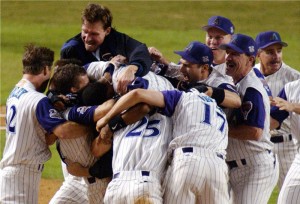Would a Salary Cap Mean Increased Parity for MLB? 11

Would a salary cap in baseball give more teams like the 2001 Arizona Diamondbacks a chance to compete for the World Series title?
Talking about a salary cap with a baseball player or his agent is as usually received as well as asking Tiger Woods how married life is treating him. The Major League Baseball Players Association (MLBPA) has a pretty simple stance on the concept of placing a ceiling on what teams can spend on wages, and that stance is “Nope!”
While purists still know that baseball is the American pastime, football is king these days in all real senses. It is outwardly more popular, has better television ratings (mostly since there’s so much less of it), and makes lots and lots of money. Oh, yes, it also has a salary cap. What’s more, NFL Commissioner Roger Goodell wants you to know that it is one of the main reasons the NFL is as great as it is, for it’s the salary cap and revenue sharing that create the NFL’s wonderful parity.
There is a continuum in professional sports where the concept of parity is concerned. In a nutshell, it tells us that the higher a team ranks in terms of league payroll, the less they care about parity. This is irrelevant for the NFL, because they have a salary cap. Read the rest of this entry →